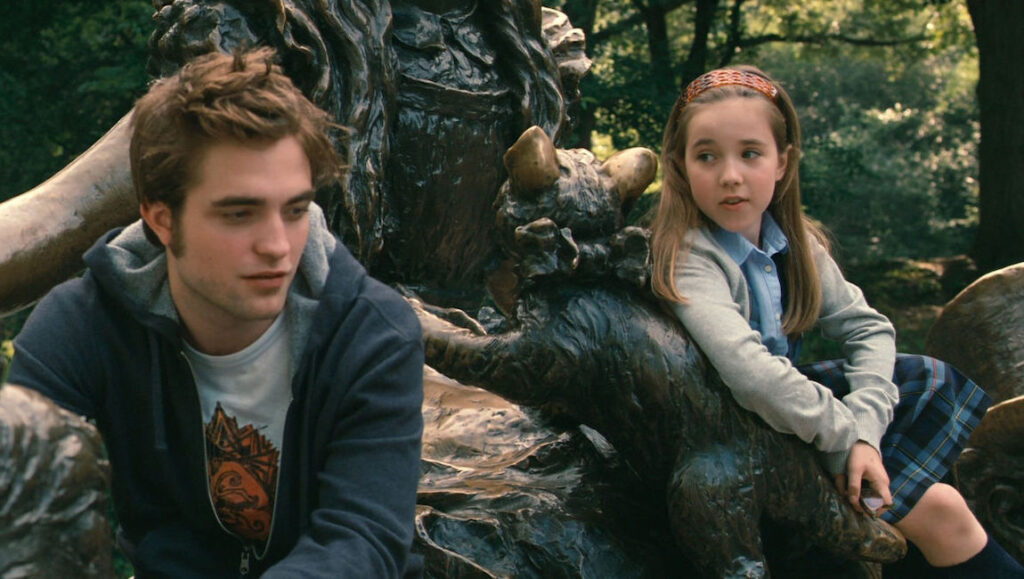In Remember Me, Robert Pattinson’s voiceover twice cites a possibly-apocryphal quote by Gandhi: “Whatever you do in life will be insignificant. But it’s very important that you do it because no one else will.” By the second appearance of this quote, it has been rendered hideously ironic by the film’s climax, which serves only to make the preceding 100 minutes seem like so much pointless kerfuffle. I dislike judging the entirety of a work based on its grand finale, but I’ve no option under the circumstances; discontent on being a generic young-love romantic drama, Will Fetters’s screenplay grasps for cultural significance in the home stretch, and squanders what may have otherwise been close to passable. It’s clear from Remember Me‘s precisely-framed opening shot that the journey entailed will not be a happy one. Director Allen Coulter opens his film with a young girl witnessing the shooting of her mother on a New York City subway platform, during a robbery gone sour. Ten years later, that girl has grown into college student Ally Craig (Emile de Ravin), and the accident has left her caring NYPD detective daddy (Chris Cooper) a little overprotective. Enter Olympic-level brooder Tyler Hawkins (Robert Pattinson), also burdened with a family tragedy and daddy issues. His self-destructive lashing-out recently got him arrested by Ally’s father, following a brawl outside a nightclub. After espying Ally on campus, he’s goaded into asking her out by his roommate, Aiden (Tate Ellington) — all for the purposes of revenge, of course.
But opposites attract, right? These two are practically photo-negatives of each other. Ally is collected and responsible; Tyler is aimless. Ally’s dad pries repeatedly; Tyler’s is your standard-issue emotionally-distant rich business man (Pierce Brosnan, bringing more dignity to this role than deserved). And where the suicide of Tyler’s brother has left him filled with ennui and snide antipathy, Ally believes in consuming dessert before dinner, being open and friendly and generally trying to make the most of life. Because you never know when you’re going to be shot dead on a subway platform, or… now I’m getting ahead of myself. But you can see how the specter of tragedy towers over the proceedings here. There’s a crushing sense of foreboding that has infected the story at its roots, so that even the happier moments are tainted. The familiar cycles of love and loss, breakup and reconciliation, forgiveness and redemption, play out accordingly. Tyler and Ally fall in love. The latter’s father doesn’t like her burgeoning independence. Ally leaves after Dad smacks her. Tyler’s pop remains remote. Tyler broods and yells at his father for being remote and ignoring his artistically-inclined younger sister (Ruby Jerins). Ally discovers the secret behind Tyler’s initial courtship — there are tears and fights. Some girls at school are mean to Tyler’s sis. Tyler throws a fire extinguisher and gets arrested — again. And Aiden talks of bedding an Eskimo. Meanwhile, the astute members of the audience wait for the boom to be lowered.
And is it ever lowered. The last fifteen minutes of Remember Me are an ignoble collision of good intentions and terrible execution. Was there nobody involved in production to question the breathtaking tastelessness of the script’s climax? Did nobody think it a mite bit meretricious? I don’t think Coulter and Co. set out to be repugnant; indeed, I have a strong idea of what he was aiming to accomplish. But if my suspicions are correct, why save this whopper for the last moments? If a very particular emotional state is what you’re trying to illuminate, wouldn’t you be better off putting this in the middle of the film, and showing your characters actually dealing with it instead of treating it like a hackneyed shock twist? This decision is ruinous, negating what marginal quality the previous hour-forty displays. So I cannot fault the actors; they work hard to mold what they can from assigned melodrama types. Brosnan is especially convincing, managing to find notes of grace within his character by film’s end. And the leads, though not of the same caliber, are as good as they need to be. Even Pattinson, in the script’s lighter moments, gets to show that he might someday develop into an interesting talent—once he frees himself from the shackles of brooding that have developed for his intensely-chiseled features. His rapport with Ellington’s Aiden, who plays the live-wire charming asshole with panache, is spiky and believable, and his early scenes with de Ravin’s Ally are awkwardly convincing, even as they devolve into tired bits where two burgeoning lovers playfully/mock-aggressively squirt each other with water. I especially liked his attitude — half-confident, half-rueful — when playing a rigged carnival game to win de Ravin an enormous panda. Too bad the film he’s in is equally rigged.


Comments are closed.